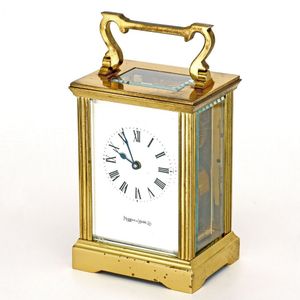Edwardian gilt brass carriage clock by Mappin & Webb
Edwardian gilt brass and bevelled glass carriage clock with white enamel face by Mappin & Webb
You must be a subscriber, and be logged in to view price and dealer details.
Subscribe Now to view actual auction price for this item
When you subscribe, you have the option of setting the currency in which to display prices to $Au, $US, $NZ or Stg.
This item has been sold, and the description, image and price are for reference purposes only.
- Bevel / Chamfer - In furniture making, a chamfered corner refers to a technique used to create a smooth, angled edge on the corner of a piece of furniture. This is typically done by cutting away a small portion of the corner at an angle, typically 45 degrees, creating a diagonal edge, rather than a sharp 90-degree angle. This technique can be used on various parts of a piece of furniture such as table legs, drawer fronts, or door frames. Chamfering can add visual interest to a piece and can help to soften the overall look of a piece of furniture. It is often used in conjunction with other techniques, such as rounding edges or using contrasting wood species to create a more elegant, sophisticated look. Chamfering is a simple way to add a touch of elegance to a piece of furniture and it is a common technique used by furniture makers.
- Edwardian - The Edwardian period of English furniture and decorative arts design is named for Edward VII (1841 ? 1910) who was King of the United Kingdom and the British Dominions and Emperor of India for the brief period from 1901 until his death in 1910. It follows the Victorian period, in turn was followed by the Art Nouveau and Art Deco styles. In Australia, designs of this period are also known as being in the Federation style.
This item has been included into following indexes:
- clocks, carriage
- Mappin & Webb (England) - clocks, maker or retailer 22
